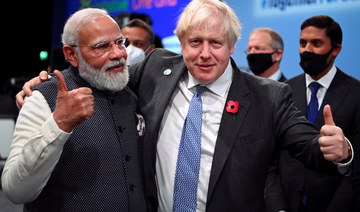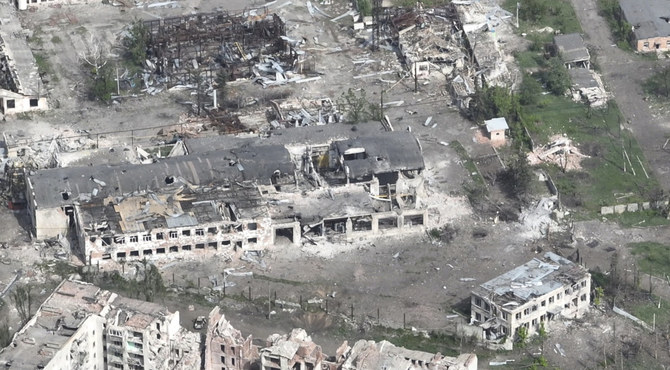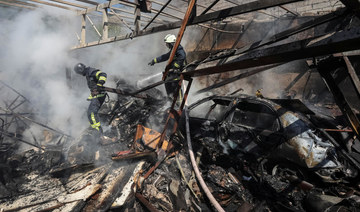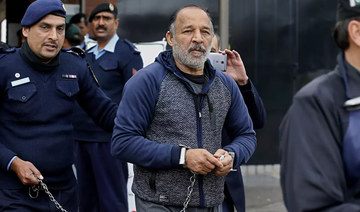GLASGOW: Negotiators concluded the third day of the UN Climate Change Conference (COP26) in Glasgow on Wednesday, with discussions focused on finance.
British finance minister Rishi Sunak kicked off day three with a pledge to “rewire” the global financial system for net zero.
Sunak said London would also commit $136.19m to make climate finance more accessible to developing countries.
The morning announcement – that most of the world already knew the previous day – followed Tuesday’s run of news which saw world leaders reach agreements on deforestation and curtailing methane emissions.
Here are the highlights of the events of day 3, Wednesday as they unfold (all times are GMT)
06.50pm: The UN climate conference urged sports organizations and teams worldwide to meet the environmental targets they signed up to.
FIFA, the International Olympic Committee, the NFL, the NBA and the New York Yankees are among nearly 300 signatories to the Sports for Climate Action Framework (S4CA) since the Paris climate agreement was reached in 2015.
“These organizations are now being challenged to reduce emissions 50 percent by 2030 at the latest and to achieve net-zero emissions by 2040,” Patricia Espinosa, UN Climate Change Executive Secretary, said.
Members of S4CA also “commit to submitting plans to outline concrete actions that will be taken to implement 2030 targets” and publish annual updates, the UN said.
--------------------------------
Read More:
US and UAE launch $4bn agricultural innovation initiative at COP26
--------------------------------
3.00pm: US climate envoy John Kerry, nearly three dozen large corporations including Apple and Amazon, and the World Economic Forum are launching an alliance to build a market for technologies that generate low levels of carbon dioxide.
The First Movers Coalition announced aims to help companies set their purchasing plans in a way that will “create new market demand for low-carbon technologies,” the World Economic Forum said.
Among the other companies involved in the coalition are aerospace company Boeing, cement company Holcim, and vehicle makers Volvo and Scania.
Opinion
This section contains relevant reference points, placed in (Opinion field)
02.00pm: Saudi Arabia’s Minister of Tourism Ahmed Al-Khateeb said that Crown Prince Mohammed bin Salman announced the establishment of the Sustainable Tourism Global Center in the Kingdom, which will gather government, academia and international organizations concerned with tourism to learn about sustainability and share best practices.
Speaking during a Saudi-chaired session on the third day of COP26 entitled “Making Tourism Part of the Solution,” Al-Khateeb discussed how the center will “help the tourism industry transition to net zero emissions and drive action to protect nature and support communities.”
David Livingston, adviser to US envoy for Climate John Kerry, said the center is a terrific contribution not just to Saudi Arabia’s green initiative and plan but also globally.
Livingston, who was recently in Riyadh for the Middle East Green Initiative Summit, said there is so much excitement in Saudi Arabia about the opportunities that exist in the green transition.
The special session was chaired by Felipe Calderon, former president of Mexico and chair of New Climate Economy and the World Resources Institute, and included other leaders.
John Denton, Secretary General of the International Chamber of Commerce, said despite how much the real economy has suffered due to the COVID-19 and climate change, “the fact that Saudi Arabia has seen fit to focus on this very important value sector in tourism is critical.”

Delighted to be partnering with @AhmedAlKhateeb, Saudi Arabia’s Minister of Tourism, to launch a major new center to help small businesses in the tourism sector to take #climateaction. #COP26 pic.twitter.com/4UFrF9Nzoq
— John W.H. Denton AO (@ICCSecGen) November 3, 2021
11.50am: US special envoy for climate John Kerry said that the talks in Glasgow have more energy and focus than previous rounds of climate negotiations in particular because of the strong presence and support of the private sector.
“I think we are going to have the greatest increase in ambition we’ve ever had, we probably do in these first 36 hours, and the real issue is going to be follow-up, working with them,” Kerry told a gathering of mayors from around the globe involved in climate initiatives at a local level.
11:00am: Asian Development Bank (ADB) launched a plan to speed the closure of coal-fired power plants in Indonesia and the Philippines to lower the biggest source of carbon emissions.
The proposal – announced at COP26 - called Energy Transition Mechanism (ETM), plans to create public-private partnerships to buy out the plants and wind them down within 15 years, far sooner than their usual life.
--------------------------------
Read More:
UK plans to become world’s first net zero finance hub
--------------------------------
10:30am: IMF Managing Director Kristalina Georgieva said the fund was working hard to support nations to adopt carbon pricing and that she was encouraged by the increasing adoption of it by members.
Georgieva said: “The shift in integrating carbon price is there and we are working very hard to support countries to take that shift.”
An international #carbon price floor should be equitable and pragmatic. Read more about carbon pricing in remarks by @KGeorgieva at #COP26 https://t.co/sfhGnC3VSR pic.twitter.com/LNlK3ZPTO0
— IMF (@IMFNews) November 3, 2021
10.20pm: A spate of last-minute pledges from developed countries have made it possible but not certain that a target of $100 billion in climate financing could be reached in 2022, Germany’s state secretary for the environment said.
“We thought already three weeks ago that we would have all the pledges,” he said, adding: “But we saw even yesterday from Japan a very substantive announcement... So if we are lucky we can reach $100 billion in 2022 but definitely in 2023.”
09:50am: UN climate envoy Mark Carney called for more blended finance facilities to mobilize private finance to help the developing world access climate finance, saying the money was there.
“We need blended finance facilities that don’t mobilize fractions of private capital for the public dollar but multiples ... in double digits. There are facilities that are being developed that can do this, we need to scale them dramatically,” he said.
Today at #COP26, Chancellor @RishiSunak and I convened 36 international partners to welcome the @IFRSFoundation’s plan to create global #climate reporting standards to give investors the information they need to finance #netzero. https://t.co/1wMugEI65L
— Mark Carney (@MarkJCarney) November 3, 2021
“The money is here but that money needs net zero aligned projects and there’s a way to turn this into a very, very powerful virtuous circle and that’s the challenge.”
09:23am: British finance minister Rishi Sunak pledged to “rewire” the global financial system for net zero, saying London will also commit £100 million ($136.19 million) to make climate finance more accessible to developing countries.
Outlining Britain’s strategy over the next five years, he said London would also support a new capital markets mechanism to issue billions of new green bonds.

“Six years ago Paris set the ambition, today in Glasgow we are provided the investment we need to deliver that ambition,” he added.
--------------------------------
Read More:
UK tells private sector it must invest big to save planet
---------------------------------
09:00am: US climate envoy John Kerry said that current commitments on cutting carbon emissions meant the world had a 60 percent chance of capping a rise in the average temperature at 1.5 degrees Celsius.
Speaking at a breakfast event with world mayors, he said with the most recent commitments made at COP26, around 65 percent of global GDP was now covered by implementable climate change plans.
“But that means 35 percent isn’t. And we can’t do it without that 35 percent.”

08:00am: China flagged it is targeting a 1.8 percent reduction in average coal use for electricity generation at power plants over the next five years, in a bid to lower greenhouse gas emissions.
The target was announced by China’s economic planner, the National Development and Reform Commission.
NDRC’s statement did not refer to the UN event, which Chinese President Xi Jinping is not attending and offered no additional pledges in a written response.
--------------------------------
Read More:
China targets 1.8% cut in average coal use at power plants by 2025
-------------------------------





























